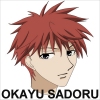  |
| Author |
|
husky51
The Old Guy
    

Registration Date: 03.16.08
Location: Southern California
Posts: 12873 |
|
|
This kinda got started in a spambot thread and Saddletank suggested that when the spambot thread is eliminated, we'd lose this conversation that had developed. So I am going to try and save the posts as much as possible by adding the consecutive posts here in this one post to start it...
==========================================
Heidi80 quote:
Arigato gusaimasu, Saddletank-san. *bows and hits report button*
==========================================
saviour quote:
is it gosaimas
or the one here
cause what i hear is gosaimas
and i think it means thank you or welcome or grettings
subs does say thank you only but it is used in variety of situations
==========================================
Husky quote:
@saviour
Not an expert in Japanese, but when the word in written by a non-speaker of the language, it is usually spelled out by the way that person pronounces it using their own language's pronounciations.
^^^ if this makes any sense... lol
Different ways to say thank you in Japanese. The three that I am aware of are:
Domo... a casual 'thanks' ( when asking for where an item is, the salesclerk says, "It's over on aisle 5" )
Arigato... a deeper 'thank you' (domo arigato might also be used) (When asked the salesclerk takes you over to aisle 5 and points it out to you)
Domo arigato gosaimusu... A very heartfelt 'thank you' (When asked the salesclerk takes you to the item, helps you with your selection, goes back to the register for you to pay and then wraps it for you)
The examples given are simplified, but you can get the gist of it I think.
(note: in Japanese words that are spelled out in Roman letters, the 'u' on the end is usually silent...)
each thank you is accompanied by a deeper bow as the thank you increases in depth of feeling.
Anybody may correct me if I am wrong. There may also be other words of thanks that I am not aware of.
==========================================
saviour quote:
Thanks Husky
What about goodbye
From Anime point of view i find sayonara to be very formal or negative or sad in meaning but saw its use in totoro.
==========================================
Husky quote:
I'm sure that there are other ways to say good-bye in Japanese, but the only ones that I know are 'sayonara' and 'oyasuminasai'.
The first is good-bye and the second is good night.
Again, these are subject to correction by Japanese speakers.
==========================================
saviour quote:
To me sayonara feels more like farewell than goodbye
==========================================
Saddletank quote:
Yes, that's right. I think its use is supposed to be more formal and is used when you do not expect to see the other person again. Generally, it is said that the number of times you say "sayonara" is as often as you say "hajimemashite" ("how do you do?" or "I am pleased to meet you," used when meeting someone for the first time.
I like the informal farewells:
"Ja (ne)" : See you!
"Mata (ne)" : Later! (lit. See you later)
"Mata ashita" : (lit. see you tomorrow)
"Mata raishuu" : (lit. see you next week)
"Bai-bai": (is cute and mostly used by girls)
"Saki in iku/ikimasu (informal/formal)": I'll be going first (ahead of you).
I was also thinking, if UO kills the spam above, we might lose this interesting thread, so we might want to discuss the Japanese language elsewhere.
Its also not a Ghibli thread.
=========================================================================
There, this completes all the posts...
Enjoy! 
__________________
    
Post last edited by husky51 on 09.28.2012, 08:15 PM.
|
|
 09.28.2012, 07:51 PM 09.28.2012, 07:51 PM |
   
|
arren18
Administrator
    
Registration Date: 08.15.06
Location: Edinburgh
Posts: 10721 |
|
|
Good idea Husky and Saddles! This could be a very useful thread, and as I study Japanese at university I might be able to help people out. 
So for ways of saying "thank you", "arigatou" is the basic word, which on its own is fairly informal. Sticking on "doumo" at the start and/or "gozaimasu" at the end is more formal. A general rule is that the more bits you stick on, the more polite you sound. More casually, "doumo" is used alone as a sort of abbreviated version.
The "goodbye"s I've heard most often are "ja/dewa mata" (ja is more likely when spoken and dewa more likely in writing) as a vague "see you later" and "mata ashita" as "see you tomorrow" (you can replace "ashita" with other words for specific times). In keeping with the rule of adding on more words to be more polite, the opposite is also true, so "ja (ne)" as mentioned by Saddles is pretty casual. I don't think I've ever heard "sayounara" used, though it is the closest to "goodbye". Finally, Husky mentioned "oyasuminasai" which means "goodnight", so that's quite a specific use.
With spelling, for the sake of accuracy I tend to leave in "ou" which indicates a long "o" sound in Japanese (there are other long vowels too), but it is often shortened to just "o" because for speakers of English and other languages using the same alphabet, the sound might not be obvious otherwise.
Anyway, I hope that was helpful! I'd be happy to try answering other questions, though my Japanese is still pretty limited.
__________________

|
|
 09.29.2012, 01:02 AM 09.29.2012, 01:02 AM |
   
|
Saddletank
Miyazaki's Best Friend
    

Registration Date: 09.28.06
Location: On your case
Posts: 10072 |
|
|
Thanks to Heidi and Saviour as well, who started us off.
I've often wondered about the rules of Roman alphabet (Romaji) with Japanese spelling. I tend to write "Arigato" while many others use "Arigatou".
"Domo" against "Duomo" and so on.
When I hear spoken Japanese in anime I never detect a 'u' sound, or even a longish 'o'. "Arigato" always seems to have a short, sharp ending. An "oh" sound more than anything longer which I suppose can best be conveyed by the letters "ou" or "ouh".
Maybe its the kinds of animes I watch which are almost exclusively contemporary settings with young people/students. Maybe they are using a modern style. I have no idea.
__________________
Isakaya High School Roleplaying Info
"An old man like me stands no chance fighting against a high school girl in her underwear" - Oshino Meme, Nekomonogatari (Kuro)
Post last edited by Saddletank on 09.29.2012, 03:41 AM.
|
|
 09.29.2012, 03:40 AM 09.29.2012, 03:40 AM |
   
|
arren18
Administrator
    
Registration Date: 08.15.06
Location: Edinburgh
Posts: 10721 |
|
|
Yeah, there isn't really an u sound in there; it's just a Japanese spelling convention. The long o is usually written as √£¬Å≈Ý√£¬Å‚ÄÝ, ou, or in a few cases as√£‚Ǩ‚Ǩ√£¬Å≈Ý√£¬Å≈Ý, oo. And sometimes in speech, especially more casual speech - it seems to me that anime tends not to bother much with the more standard formal speech level - the long vowels don't come across all that clearly, and at the end of words it can disappear somewhat.
As for the actual rules of romaji, normally it'll be written as ou/oo, to fit with the original spelling, or ō, to indicate a long vowel but also making it clear which sound it is.
__________________

|
|
 09.29.2012, 04:18 AM 09.29.2012, 04:18 AM |
   
|
Roarkiller
Your Daddy-O
    

Registration Date: 06.02.03
Location: Home, resting...
Posts: 6077 |
|
|
Generally, for those who understand japanese itself, they spell japanese words using a direct copy of the japanese kana itself with minor changes, if at all.
For example, "Miyazaki Gorou" can sometimes be spelled as "Miyazaki Goro", because in English, the extra long vowel is barely discernible. Likewise, the particle "ha" is more often spelled as "wa" because of the way it is spoken; likewise, the character "hu" is usually spelled as "fu".
Strictly speaking, the isn't any 'F' in the japanese language (hence "kohii" for coffee). Imagine you're whistling. Now imagine you're blowing lightly. That's what it sounds like. For visual, the closest is probably to imagine "fool" written as "... ool". Your upper teeth do not touch your lower lips, basically.
__________________
I am me.
I am who I am.
I am Roarkiller.
No one else is me.
Roarkiller.net
Isakaya High RPG Site
quote:
Originally posted by fenkashi
Screw your opinions, they are not relevant ^^.
|
|
 09.29.2012, 06:49 AM 09.29.2012, 06:49 AM |
   
|
foreignfilmfreak
Miyazaki's Best Friend
    

Registration Date: 10.02.06
Location: Japan
Posts: 7589 |
|
|
Yeah, in Japanese class, we have to spell out words like they would be in kana. :B Or something.
We use Domo Arigatou Gozaimasu in class, but I'm more used to "Ookini". WTF. XD Why am I more used to ookini... They will definitely find me strange.
Also, I SUCK at words with the shi and tsu hiragana characters in them. I almost chucked my book at the wall in class because I just can't do it. XD
But, arigatou in hiragana, at least in my class, has the "u" character at the end. D: But it's not in "domo". But I guess it could be romanized as "arigato". We aren't allowed to use romanized words at all now.
On a side note, I met an exchange student who is originally from Hokkaido. XD I kind of freaked him out because he was really surprised I knew where Hokkaido was (I've always wanted to go to Hokkaido...). Then he was like, "Yes, love Hokkaido! Hokkaido is the best". My friend and his friend teased him for being so biased.
|
|
 09.30.2012, 08:57 AM 09.30.2012, 08:57 AM |
  
|
saviour2012
Baron
   
Registration Date: 02.24.12
Location: Dhaka,Bangladesh
Posts: 1747 |
|
|
 09.30.2012, 09:49 AM 09.30.2012, 09:49 AM |
    
|
Kazegami
Miyazaki's Best Friend
    

Registration Date: 08.19.07
Location: a world of pure imagination
Posts: 7030 |
|
|
If it's pronunciation you want to know, that's very easy in Japanese, since the sound of the characters never change no matter how they're combined.
If that is what you're asking... I'm not quite sure.
__________________
My Anime List
|
|
 09.30.2012, 10:26 AM 09.30.2012, 10:26 AM |
  
|
foreignfilmfreak
Miyazaki's Best Friend
    

Registration Date: 10.02.06
Location: Japan
Posts: 7589 |
|
|
You just pronounce it as is, softly and without force. Or something like that. :B I know if you pronounce something wrong to my professor, she just closes her eyes and tells you to repeat it. Over and over.
Mine is basics, or at least that's what my professor considers basics.. XD
|
|
 09.30.2012, 12:05 PM 09.30.2012, 12:05 PM |
  
|
arren18
Administrator
    
Registration Date: 08.15.06
Location: Edinburgh
Posts: 10721 |
|
|
For pronunciation it's generally the same sounds the letters would make in most other languages. Roughly, a is as in "hat", i is like the vowel in "beat", u is like the vowel in "soot", e is as in let, and o is as in "note". Maybe sure to keep them short unless they're long vowels (aa, ii, uu, ei/ee, ou/ou). Sometimes keeping them short can make them disappear, especially with u (as well as i in the cases of shi and ki, and sometimes o in to and do).
Again, consonants are roughly the same. There are some subtle nuances with both consonants and vowels for making them sound more accurate, but you really have to listen to understand those. The most glaring things I think are r and f. The r sound is made with the tip of the tongue near the back of your teeth, much like you'd do for an l sound, but not quite so far forward. The result is very close to the l sound, hence the confusion between r and l for Japanese people speaking in other languages. Roar has mentioned the f sound; I wouldn't say there isn't one, because what they do have does sound pretty similar to our f sound, and they do actually use that to indicate f in lone words like, say, "fairu" (file).
So that's me making it as basic as I can while still actually telling you something. If that's not what you wanted (but if you don't want any grammar at all there's not much more I can add) then say so.
__________________

|
|
 09.30.2012, 12:58 PM 09.30.2012, 12:58 PM |
   
|
foreignfilmfreak
Miyazaki's Best Friend
    

Registration Date: 10.02.06
Location: Japan
Posts: 7589 |
|
|
I forgot, some people get confused with the "o" or "ou" in spelling, and I forget that since I'm from Canada that America has a different spelling for certain words.
Like, the word harbour. It's spelt harbor in America, but here, it's spelt harbour. And there's no difference in sound. :B
I am tired right now, so this may make no sense (and neither will my homework).
|
|
 09.30.2012, 01:03 PM 09.30.2012, 01:03 PM |
  
|
arren18
Administrator
    
Registration Date: 08.15.06
Location: Edinburgh
Posts: 10721 |
|
|
Oh, about confusing with o and ou, I just meant the fact that in English and I guess in other languages as well, they can be different sounds. In a lot of languages, ou is an u sound, and then English has words like "hour" and "you". So I think people could still definitely get confused. 
__________________

|
|
 09.30.2012, 01:10 PM 09.30.2012, 01:10 PM |
   
|
Kazegami
Miyazaki's Best Friend
    

Registration Date: 08.19.07
Location: a world of pure imagination
Posts: 7030 |
|
|
Damn, I love languages. The more you learn the more it all makes sense. Those little sudden realisations are great.
I was just just now wondering...
Is "√£¬ÅÀú√£‚Äö∆í√£¬Å¬™√£¬Å‚Äû" just a less formal version of "√£¬ÅÀú√£‚Äö∆í√£¬Å‚Äö√£‚Äö≈Ý√£¬Å¬æ√£¬Å‚Ä∫√£‚Äö‚Äú"?
And is "√£¬Å¬Ý" a less formal, condensed form of "√£¬Å¬ß√£¬Å‚Ñ¢√£¬Å‚Äπ"? As in "√£¬Å¬Ý√£‚Äö≈í√£¬Å¬Ý" versus "√£¬Å¬Ý√£‚Äö≈í√£¬Å¬ß√£¬Å‚Ñ¢√£¬Å‚Äπ".
Having thought about it a bit, the way I hear those words being used, it seems to be that way...
__________________
My Anime List
Post last edited by Kazegami on 10.26.2012, 09:04 AM.
|
|
 10.26.2012, 09:02 AM 10.26.2012, 09:02 AM |
  
|
arren18
Administrator
    
Registration Date: 08.15.06
Location: Edinburgh
Posts: 10721 |
|
|
Yep, √£¬ÅÀú√£‚Äö∆í√£¬Å¬™√£¬Å‚Äû is a more casual √£¬ÅÀú√£‚Äö∆í√£¬Å‚Äö√£‚Äö≈Ý√£¬Å¬æ√£¬Å‚Ä∫√£‚Äö‚Äú. √£¬Å¬™√£¬Å‚Äû is the negative short form of √£¬Å‚Äö√£‚Äö‚Äπ, while √£¬Å‚Äö√£‚Äö≈Ý√£¬Å¬æ√£¬Å‚Ä∫√£‚Äö‚Äú is the negative long form. The forms go by various names, but basically, the short form is what you'll find in a dictionary and usually comes up in casual speech, certain grammatical constructions, and anime and manga (where apparently everybody is already friends with each other?) Long form is a more polite version, and is the standard speech style for use with people you're not familiar with. In this case, there are other long form options: √£¬ÅÀú√£‚Äö∆í√£¬Å¬™√£¬Å‚Äû√£¬Å¬ß√£¬Å‚Ñ¢ and √£¬Å¬ß√£¬Å¬Ø√£¬Å‚Äö√£‚Äö≈Ý√£¬Å¬æ√£¬Å‚Ä∫√£‚Äö‚Äú. The former is pretty common, possibly the most common way of putting it, while the latter is the same as √£¬ÅÀú√£‚Äö∆í√£¬Å‚Äö√£‚Äö≈Ý√£¬Å¬æ√£¬Å‚Ä∫√£‚Äö‚Äú but more common in writing.
√£¬Å¬Ý is the short form of √£¬Å¬ß√£¬Å‚Ñ¢. √£¬Å‚Äπ is rare when speaking using the short form, so often √£¬Å¬Ý does take the place of √£¬Å¬ß√£¬Å‚Ñ¢√£¬Å‚Äπ, with a rising intonation at the end showing it's a question even without √£¬Å‚Äπ. Other sentence-final particles are sometimes used following √£¬Å¬Ý, to clarify that something is a question in casual speech, like √£¬Å¬Æ.
I hope that was helpful. 
__________________

Post last edited by arren18 on 10.26.2012, 10:30 AM.
|
|
 10.26.2012, 10:30 AM 10.26.2012, 10:30 AM |
   
|
SunshineandLollipops
Susuwatari


Registration Date: 10.27.12
Location: Behind you
Posts: 8 |
|
|
I read somewhere that "boku" was only for guys, but I've definitely heard women singing it in some opening themes of animes. Is it that women only use it while singing, or was the website wrong? Explaination anyone?
__________________
http://www.omrlp.com/
Monster Raving Looneys for the win!
|
|
 10.27.2012, 12:48 PM 10.27.2012, 12:48 PM |
  
|
arren18
Administrator
    
Registration Date: 08.15.06
Location: Edinburgh
Posts: 10721 |
|
|
Welcome SunshineandLollipops!
"Boku" is pretty much only used by males, but sometimes (I understand this is more in fiction than in real life), tomboyish girls might choose to use it. It also does appear in songs sometimes if it fits into the line more easily than other pronouns like "watashi".
__________________

|
|
 10.28.2012, 02:52 AM 10.28.2012, 02:52 AM |
   
|
Kazegami
Miyazaki's Best Friend
    

Registration Date: 08.19.07
Location: a world of pure imagination
Posts: 7030 |
|
|
Mm, thanks Arren. That was indeed helpful. 
__________________
My Anime List
|
|
 10.28.2012, 06:03 AM 10.28.2012, 06:03 AM |
  
|
Saddletank
Miyazaki's Best Friend
    

Registration Date: 09.28.06
Location: On your case
Posts: 10072 |
|
|
Boku.
Not to be confused with Beaucoup.
__________________
Isakaya High School Roleplaying Info
"An old man like me stands no chance fighting against a high school girl in her underwear" - Oshino Meme, Nekomonogatari (Kuro)
|
|
 10.28.2012, 11:26 AM 10.28.2012, 11:26 AM |
   
|
Kazegami
Miyazaki's Best Friend
    

Registration Date: 08.19.07
Location: a world of pure imagination
Posts: 7030 |
|
|
Question, I has one.
I was working on past-tense adjectives, translating some phrases from the textbook, when this came up that I wasn't sure about...
If I wanted to translate "This test was difficult", would that be:
√£¬Å‚Äú√£¬Å¬Æ√£∆í‚ÄÝ√£‚Äö¬π√£∆íÀÜ√£¬Å¬Ø√£‚Äö‚Ǩ√£¬Å≈°√£¬Å‚Äπ√£¬Å‚Äî√£¬Å‚Äπ√
£¬Å¬£√£¬Å≈∏√£¬Å¬ß√£¬Å‚Äî√£¬Å≈∏
or
√£¬Å‚Äú√£¬Å¬Æ√£∆í‚ÄÝ√£‚Äö¬π√£∆íÀÜ√£¬Å¬Ø√£‚Äö‚Ǩ√£¬Å≈°√£¬Å‚Äπ√£¬Å‚Äî√£¬Å‚Äπ√
£¬Å¬£√£¬Å≈∏√£¬Å¬ß√£¬Å‚Ñ¢
or even
√£¬Å‚Äú√£¬Å¬Æ√£∆í‚ÄÝ√£‚Äö¬π√£∆íÀÜ√£¬Å¬Ø√£‚Äö‚Ǩ√£¬Å≈°√£¬Å‚Äπ√£¬Å‚Äî√£¬Å‚Äû√
£¬Å¬ß√£¬Å‚Äî√£¬Å≈∏
I don't think it's the third, but I don't which of the first two it should be. I don't know whether both the adjective and the です need to be in past tense or whether it's just the adjective.
__________________
My Anime List
|
|
 03.22.2013, 02:34 PM 03.22.2013, 02:34 PM |
  
|
arren18
Administrator
    
Registration Date: 08.15.06
Location: Edinburgh
Posts: 10721 |
|
|
むずかしかったです。
This type of adjective conjugates and in general behaves like a verb. That means that it is the part that changes to the past tense. です isn't really serving a grammatical purpose here - it's just a politeness marker in this case. Therefore it doesn't make sense to make that past tense also.
__________________

|
|
 03.22.2013, 04:25 PM 03.22.2013, 04:25 PM |
   
|
|
|
  |
|
Online Ghibli
Ghibli Tavern is powered by WoltLab, hosted by Teragon Networks
|
|






































































































